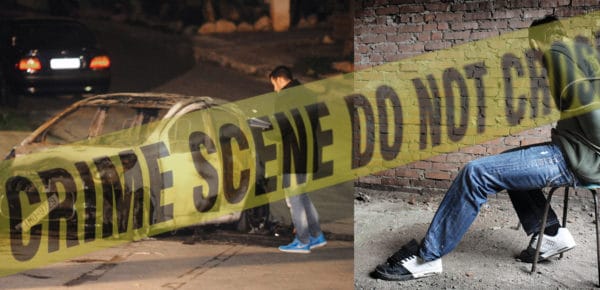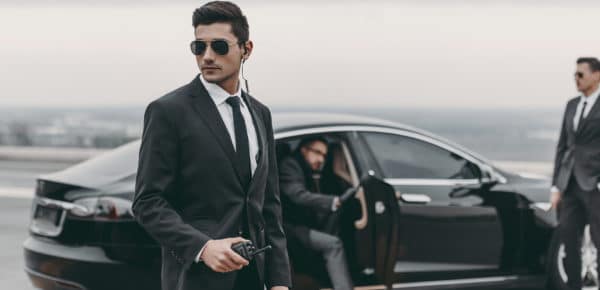Professor Itay Gil is an international iconic figure in the security field. His professional trajectory is enviable by many. He remains an active captain of IDF (the Israeli Armed Forces), having served in the Special Reconnaissance Paratroopers Company of Israel. After concluding his mandatory military service, he chose to become part of the Counter Terrorist unit (Yamam) in Israel, specializing in hostage rescue. For Yamam, Mr Gil has participated in hundreds of operations in the course of over 10 years.
Interview to Nikos Papadopoulos and Efthimios Pavlides
Yamam is considered by many as the top special operations unit in the world, in part due to the toughest selection process. Candidates are required to have previously served in the Special Forces to even apply for the unit.
Mr. Gil knows very well how to calculate the terrorist dangers thanks to the experience he has had after his involvement in actual conflicts. Mr. Gil was the lead instructor of the security details of Israeli presidents, emeritus professor at the University of Aspen, former director of the Magid Institute for the field of Terrorism, Internal Security and Intelligence. Nowadays he teaches at the Ariel University. Mr. Gil is the man behind the idea of what is now called by IATA training against unruly and disruptive passengers. He conceived the idea and turned it into a training seminar in 1997, based on observations he made during his travels.
When did you enlist in the Israeli Armed Forces, in what unit and how long did you serve?
I joined the IDF in 1981, as part of the Airborne Recon unit. I served for a total of three years.
When did you transfer to Yamam? How difficult was it for you to join the top antiterrorist unit of your country?
I applied for Yamam in 1985. The selection process, following evaluation and testing, lasts 8 to 12 months and all candidates must have a Special Forces background. Approximately 2.500 young people will apply, but the unit will assess them and finally select and approve just 100 of them to go through Hell Week. On an average, 30 participants will make it. The rest of them will fail Hell Week. Theses 30 people will begin the Counter Terror School, and after a whole year of training, if they survive the tests, they get certified and spring into action. I was operationally ready in 1986.
What was your role in Yamam? Are you still active today? Can you tell us a few things about your current position?
In order to get certified from the Counter-Terror School it is required to become an expert in numerous skills. My role was multi-layered. I was the person who breached doors and windows, I was a high speed driver, I was an expert in Close Quarter Battle, a tactic that involves the physical confrontation of many opponents. I was also a sniper, when needed. I later became one of the top instructors in Krav Maga, a self-defense system based on direct physical contact. I am not currently active, since I am now 52 years old, but because of my experience I work as a consultant with the Unit and, occasionally, as an instructor.
What is the most important thing that you gained from your experience in Yamam, apart from the high standards of this military unit?
There are a lot of things that I’m not at liberty of talking about. I can tell you this, though. It was an amazing experience, an adventure with a group of amazing people, some of whom are now part of the leadership of the Ministry of Defense. Nevertheless, our permanent concern was the deterrence of the next terrorist attack and of anything that could jeopardize internal security. You learn to work within a team, you become a person that never gives up; you become a fighter. You also become the person that can always come up with a solution to any problem. We have a lot of units, but Yamam is the “long arm” of the government, the unit that launches almost all these complicated operations that, naturally, do not become public.
When did you decide to start implementing PROTECT ISS and what do you hope to achieve through it? What are your future goals?
The idea came to my in 1996, when I was still active with Yamam. In 1997, I was the education director of the Israeli Border police school, the IBP, and after 14 years of active service I retired.
I made the decision that at that point I wished to continue with my own business and to invest on my knowledge. So I started PROTECT ISS. It started off as a small training center for shooting, for hand to hand combat and for consulting services on security issues. Step by step, we expanded our operation in countries outside Israel and we are still evolving today.
Nowadays, PROTECT ISS is very well known and established and we work with approximately 20 branches and subsidiaries around the world. This has helped us solve the problem of providing training, consulting, close personal protection and other services in all of these 20 countries. As for future goals, we just strive to evolve. Our passion and our love for the job guide us.
We train and educate people so they can perform better, so they can protect themselves, their families and their businesses efficiently. Training provided by PROTECT ISS is accredited by the universities that we collaborate with, so we can supply with certifications and diplomas from these universities, such as Ariel. Furthermore, I am an Emeritus professor in the University of Aspen.
Undoubtedly you have endured many difficult situations and incidents throughout your military career. Have you transferred this knowledge of the actual universal experience in your classes as an instructor?
I always try to pass on my best knowledge to my trainees. So, yes, I offer my experiences “ex vitro”, where people are used to train. We do not offer static training; we offer a training that is as real as possible, under realistic conditions, formed based on our long experience. That’s what has made PROTECT ISS so successful.
Krav Maga is a way of life for you, as it is for all Israeli citizens. When did you start your Krav Maga training and how have you evolved the system?
Krav Maga is our national sport, a self-defense system for Israelis. Anybody joining the Israeli Special Forces practices on the basic elements of Krav Maga but they don’t all become experts. As far as I am concerned, from a young age I started practicing fighting sports, such as judo, sambo and karate. When I enlisted in the IDF and reported for basic training they noticed I was a charismatic athlete. The Krav Maga moves are similar to what I was doing so, naturally, I became good at Krav Maga too. I was chosen to be sent to a Krav Maga training center at the Wingate military academy for three months and that’s when I became a Krav Maga instructor. Later, when I joined Yamam, they saw me and realized that I easily dominated hand to hand combat and they selected me as a Krav Maga instructor in the antiterrorist unit.
Nowadays, more than ever, there is a growing interest on the part of Close Protection Officers in realistic Krav Maga training. Can you tell us how PROTECT ISS approaches this self-defense system?
First of all, let me say that a lot of “bodyguards” live in a fantasy world where they believe they can protect their client. The truth of the matter is that they can barely protect themselves. When people come to us to train, the first thing we do is to use “Simunition” (trademark for training ammunition produced by General Dynamics-Ordinance). Honestly, almost everybody that participates in similar operations is unable to protect their client, even during the simplest of attacks. Many believe that by going to the gym and going into body building to the point that they resemble models they become CPOs. The truth, however, is completely different. Becoming an efficient bodyguard requires proper data analysis, requires that you have perception, that you act under extreme pressure, that you know how to protect yourself against objects such as knives or guns. As a result, people who come to us go back to basic training and we start teaching them from scratch hand to hand combat, firearms combat and always under conditions of pressure and simulation of real attack situations. Our courses are impressive and extremely interesting. I don’t exaggerate when I say that a lot of people are shocked by the level of the training we provide.
During recent years a new modern approach of the training techniques has emerged that emphasizes the “think out of the box” notion instead of the old-fashioned “you will do as I say because I say so”. Do you agree? Has your training approach changed throughout all these years?
I honestly don’t follow training techniques. To be sincere, I see a lot of instructors teach techniques that I don’t believe will work in real life. One must learn what to do and do it in simulated conditions of extreme pressure, so one can function accordingly in real life.
There are many factors in the “equation”. Every attack is different. I agree that the technique must be broken down and the instructor needs to explain what he’s teaching. I have developed a system that we teach and we call “performance under pressure”. For example, we record on video multiple different knife attacks that we later analyze and check how many of them we could have prevented. Nobody can stop all knife attacks, it is impossible. The idea is, though, to increase the chances of survival.
Krav Maga is a continuously evolving dynamic system, so, yes, my teaching approach is also constantly evolving. We keep trying to improve and to evolve. Even for me there’s room to improve. For example, my students ask so many questions that at times I don’t have an answer readily available. It is my duty to explore, to try and to respond.
What kind of courses are offered by PROTECT ISS? What more can it offer to a CPO in comparison to other training facilities? Do you plan to open a similar school here in Greece?
We offer whatever the client wishes. Classic courses on basic hand to hand combat, defense against knife attack, disarming, defense against an attack with a crowbar or a bat, defense against strangulation, etc. Of course, we also have more advanced courses that require special training in the use of firearms. The VIP protection courses include formations, risk analysis and assessment. There is also another level of training on countering terrorism and on air security, on hotel security and management.
I believe that because you use force on force training we can set up a scenario based on my experience that will be realistic and efficient. That’s why we record everything on video and later on we analyze it to determine how each one has reacted (in case of shooting and evacuation scenario, for example). The same process is repeated until we reach the desired level. This process of learning is very important. We call it “biofeedback”. Watching yourself fail on video is the best learning point.
When it comes to Greece, we have already given a lot of courses and we are very willing to do it again. The financial crisis has been breeding more and more criminal behavior and situations. Thus, the need and the demand for VIP protection services and for self-defense will open new opportunities. I firmly believe that all training against any kind of threat is an investment and not just an expense on the part of the student.
Do you feel like you have a responsibility to promote and develop Krav Maga and if yes, why?
First of all, let me say that many people train in Krav Maga and not necessarily just members of the Special Forces. I would say that it is my passion to encourage people against bullying, attacks, rapes and any form of violence. I would also like to create a situational awareness for this world so that conflicts can be avoided, although it is necessary to stress, that sometimes conflict cannot be avoided. The number one rule is observation. This is how we come up with solutions so that people perform better. This is our passion; to save lives by making people feel better, safer. I feel it is a pleasant thing that we do.
You recently visited Greece for a Krav Maga seminar on defense against knife attacks. Are these seminars planned so at to be addressed to a limited audience? When are you planning on revisiting our country?
Anyone can participate in a seminar like that. As you know, the number one weapon accessible to everybody is a knife, an axe or a broken bottle, a screwdriver or even a pen. Any sharp object. For now, there is nothing planned in the foreseeable future for Greece, but I would very much like to come back.
Could you describe your professional approach of CP/VIP?
VIP protection is in essence a sum of skills related to the perception and the analysis of the threats, in order to protect the person who asks us to provide security services. There are many reasons why a person will seek security services. Our part is to analyze and determine the needs of our client and offer the best possible solution.
The most important thing for everybody is to put aside their ego. This is the biggest problem I have encountered. It is safe to say that after certain exercises this “ego” is limited. My goal is not to offend anybody, but the truth of the matter is that an actual combat situation including a VIP, for instance, takes place under different conditions and requirements. My ultimate goal is to teach somebody how to stay alive.
In your opinion, what kind of skills does a CPO require in order to be in a position to start a career in the security field?
First and foremost, he needs a solid good character. He needs to be calm, positive, optimistic, an overall good person. Next, the skills on which each person needs to train follow. High skill in hand to hand combat and in weapons handling. One needs to be proficient in threat analysis and danger assessment, to know in depth the formation protocol, to be an above average driver. Team spirit and cooperation mentality is critical, as well as knowledge of first aid. If one wants to become a true professional one will have to invest a considerable amount of money in order to reach this overall high level. The “full package” is required, and that does not come cheap.
According to the Israeli secret service, everybody should train for three days every three months. This includes a refreshment basic training on all levels, from driving to shooting, to formations, to evacuation, to first aids. It is what we call “crash course”.
What is your opinion on the way the security industry has evolved? And what is your opinion on Greek security industry specifically?
The security industry keeps growing. There is more demand, an increasing number of wealthy people need security, because of the threats and the dangers they are exposed to. More terrorist groups and organizations emerge constantly and crime is generally on the rise.
In Greece, as I mentioned earlier, there are financial problems which lead to an increase of criminal activity, such as illegal immigration, smuggling and thefts. Hotels and shopping malls, even super markets, require security. It is obvious that Greece requires more security. Furthermore, the people operating within the security field should upgrade their skills.
Would it be possible for the life and knowledge from Itay Gil’s real life experience to be depicted on the TV screen? Are you in the works of something similar?
There has been an initiative for a television show and process has started. It has not been confirmed yet, but if it does start it will be called the “Protector”. We have also made some initial contacts and taken some steps towards a reality show for BBC in which I will participate. It revolves around a camp for training and selection of Special Forces personnel.
You learn how to work as part of a team, you become the person who never quits; a fighter. People already working in the security field need to upgrade their skill set. In the security field, any kind of training against all types of threats is an investment.





